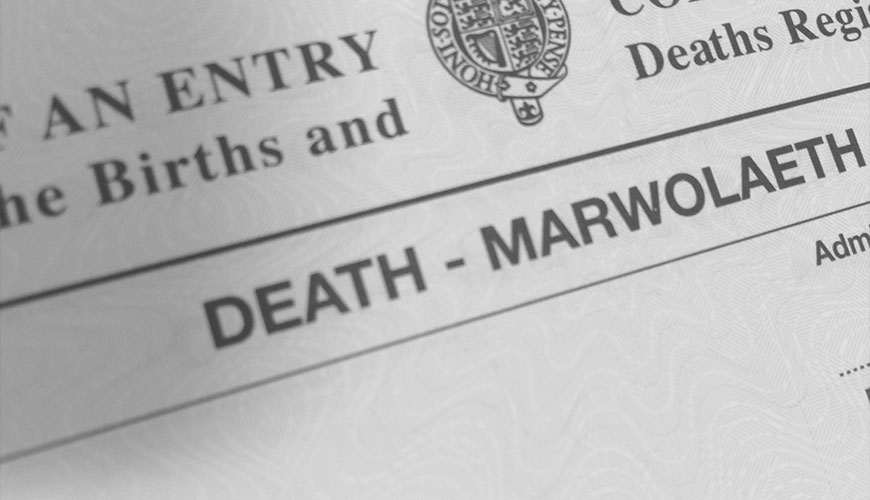Register a death

Who can register a death?
People who have a legal responsibility to register a death include:
- A relative of the deceased
- A person present at the death
- The occupier of the premises where the person died if he/she knew about it
- The person responsible for arranging the funeral (this does not include the funeral director).
You should normally register a death within five days but this can be extended under certain circumstances, for instance when the coroner is involved.
If the death has been referred to the coroner, it cannot be registered until the registrar has received authority from the coroner to proceed.
You can register at the register office in the district where the death occurred, or you can go to any register office in England and Wales and make a declaration of the particulars required.
However, if you make a declaration, there will be a slight delay in receiving certificates and paperwork.
Book an appointment
You will need an appointment to register a death. Check our facilities and opening hours.
The registrar cannot register the death until relevant, prescribed documents have been received from a doctor who was attending the deceased during their illness and/or a Medical Examiner/Coroner.
These documents are usually scanned and sent electronically to the registrar.
What will the registrar ask me?
A registrar will talk to you privately and will ask you for:
- the date and place of death
- the full name of the deceased (and maiden surname if appropriate)
- the date and place of birth
- the occupation of the deceased and the full name and occupation of their spouse or civil partner
- the deceased's usual home address
- details of any public sector pension
- the date of birth of the deceased's surviving spouse or civil partner
- the NHS medical card number for the deceased if available.
Additional information
You will also be asked to answer the following questions. This information is used for government statistics and is kept confidential.
- If the deceased was married or in a civil partnership, the date of birth of the surviving spouse or civil partner.
- How long did the deceased stay in hospital or other establishment, for example, a hospice or nursing or care home.
- If the deceased was under 75, the industry that they worked in.
- Was the deceased in receipt of an occupational pension from government funds. This will include occupations such as civil servants, NHS staff, armed forces personnel and war widows.
- The deceased’s NHS number taken from their Medical Card, if available.
When the registration is complete, the registrar will ask you to confirm that all the information is correct before signing the register.
You MUST check and confirm the information is correct before the registrar signs the register.
Once the register is signed the registrar will not always be able to correct any errors immediately and may have to apply to the Registrar General for authority to correct.
There may be a fee payable for corrections.
Documents that you will need for registration
To help us to make sure we accurately record deaths it would be helpful if you could have the following documents with you for the appointment:
To confirm the deceased person's details:
- Passport
- Driving Licence
- Proof of address (utility bill)
- NHS Medical Card
- Any change of name documents or deeds
- All birth and marriage or civil partnership certificates of the deceased
To confirm the identity of the person registering the death:
- Passport
- Driving licence
- Proof of address (utility bill)
Not being able to provide these documents will not prevent you from registering the death. However, it would be helpful to provide them wherever possible so that we can make sure our records are accurate.
Issue of the “green form” for burial or cremation
The registrar will issue a "green form" which will allow the funeral to take place.
There is no charge for this form.
Where the Coroner is involved a different procedure may apply.
Death certificates
At the time of registration, you can purchase a certified copy of the entry in the register (death certificate) for £11 each.
Certificates are Crown Copyright and should not be photocopied for official purposes.
The following is a guide to your possible needs:
- Banks
- Building societies
- Pension companies
- Premium bonds and national savings
- Life insurance/assurance
- Contracts and agreements
- Probate and wills
- Accountants
- Shares
- Travel bookings
Burials according to certain religious customs
We recognise that in some faiths, burial has to take place within 24 hours of death.
To ensure that loved ones can be buried meeting the religious timescales, if the death occurred in the Caerphilly district, a Registrar is available 24 hours a day to register the death and issue appropriate paperwork for a funeral to take place. The number to call for urgent death registration in these circumstances is 07771 886895.
The registrar must have notification from a doctor or coroner that a cause of death is known before being able to proceed.
The following document has been prepared by the Welsh Assembly Government and the Welsh Local Government Association and endorsed by the Faith Communities Forum.
WLGA - Planning a Muslim burial?
Tell Us Once
When someone has died, there are many things that need to be done, at a time when you probably least feel like doing them. One of these is contacting government departments and local council services who need to be told of the death.
'Tell Us Once' is a service where we help you give the information to the Department for Work and Pensions (DWP), they then pass it on to several other government departments and local authority services.
Bereaved families are offered this service at the register office following the registration of the death.
Further information is available on the Tell Us Once section.